How to Start a Cleaning Business: 10-Step Guide + Costs + Checklist
January 12, 2026 - 20 min read

January 12, 2026 - 20 min read

Table of Contents
Prefer listening over reading? We broke down this entire guide into a quick podcast episode covering everything from startup costs to landing your first client.
Starting a cleaning business might be one of the smartest moves you make this year. The cleaning market is expected to grow at 5.9% annually through 2029. Real estate development continues climbing, and post-pandemic cleanliness standards aren’t going anywhere.
But here’s what makes this opportunity genuinely appealing: you don’t need a warehouse full of inventory or a complicated supply chain.
A reliable vehicle, quality cleaning supplies, a solid work ethic, and a clear business plan can get you started for somewhere between $2,000 and $10,000.
This guide walks you through the entire process of starting a cleaning business from scratch. We’ll cover market research, choosing your services, legal requirements, pricing strategies, and how to win those crucial first clients.
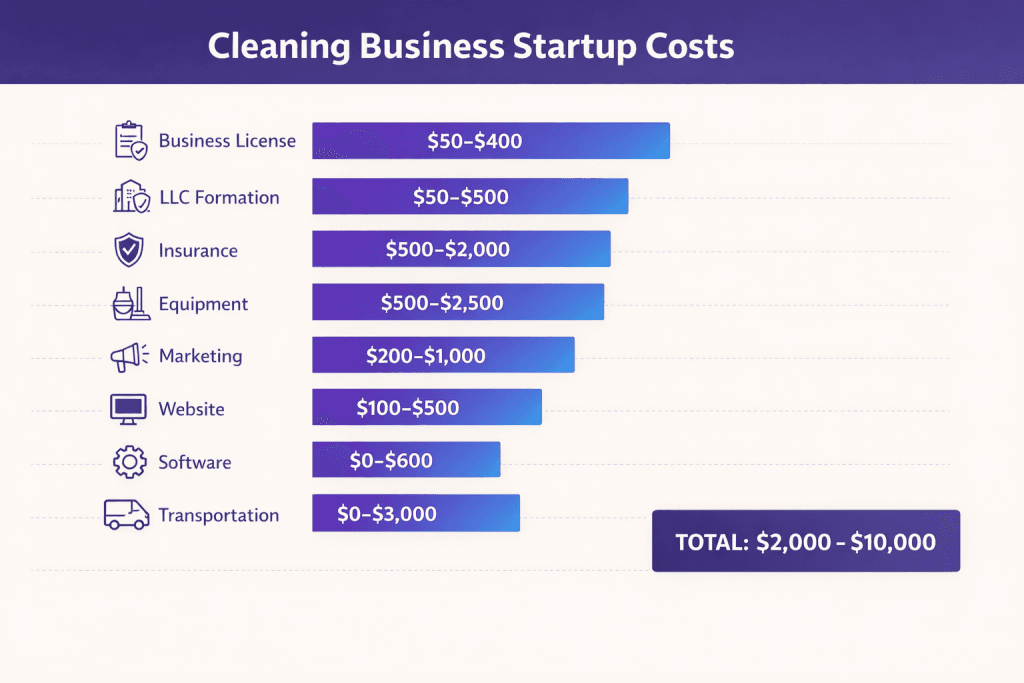
Before you spend a dollar on supplies, you need to understand who you’re selling to and who you’re competing against.
This isn’t optional homework; it’s the foundation everything else builds on.
1: Start with competitor analysis:
Search Google for cleaning services in your area, like “Cleaning services near me”.
Read their reviews (both positive and negative). Note their pricing, services offered, and what customers complain about. Check how they present themselves online.
2: Identify market gaps:
Are residential cleaning services saturated, while commercial cleaning is underserved?
Do local Airbnb hosts struggle to find reliable turnover cleaning?
Is there demand for specialized services like post-construction cleanup or eco-friendly cleaning?
3: Talk to potential customers:
Ask neighbors what they look for in a cleaning service. Connect with local property managers about their pain points. Reach out to small business owners about their current cleaning arrangements.
The goal isn’t just to confirm demand exists; it’s to find the specific angle that makes your business stand out. Maybe every cleaner in your area does standard house cleaning, but nobody offers same-day deep cleaning for move-outs. That’s your opportunity.
To help you get started, check out the recent cleaning industry trends and statistics to help your business kickstart.
Your service mix determines everything from startup costs to target customers. Don’t try to offer everything on day one; start focused, then expand as you build capacity and expertise.
A) Residential Cleaning Services
This is where most cleaning businesses start, and for good reason. Lower barriers to entry, consistent demand, and the potential for recurring weekly or bi-weekly appointments.
Standard house cleaning covers dusting, vacuuming, mopping, bathroom, and kitchen cleaning.
Deep cleaning is more intensive work, including baseboards, inside appliances, and window tracks. Move-in/move-out cleaning prepares homes for new occupants. Vacation rental turnover offers quick, reliable cleaning between guests and is increasingly in demand.
B) Commercial Cleaning Services
Higher revenue potential but often requires more equipment, insurance, and after-hours availability. This includes office cleaning for regular maintenance of professional spaces, retail cleaning for floor care and restroom maintenance, and medical facility cleaning, which requires additional training and certification.
C) Specialized Cleaning Services
These niches often command premium pricing but require specific equipment or expertise. Carpet and upholstery cleaning requires extraction equipment. Window cleaning covers both residential and commercial, including high-rise work.
Post-construction cleaning handles debris removal and detailed cleaning after renovations. Pressure washing covers driveways, decks, and building exteriors.
For detailed pricing on specialized services, check out our guide on how to charge for cleaning services.
How to decide?
Consider your startup budget, physical capabilities, and local demand. A solo operator might start with residential cleaning and add carpet cleaning after six months of steady income. Someone with commercial experience might target office buildings from the start.
The key is matching your initial services to realistic capacity. Overpromising and underdelivering kill cleaning businesses faster than anything else.
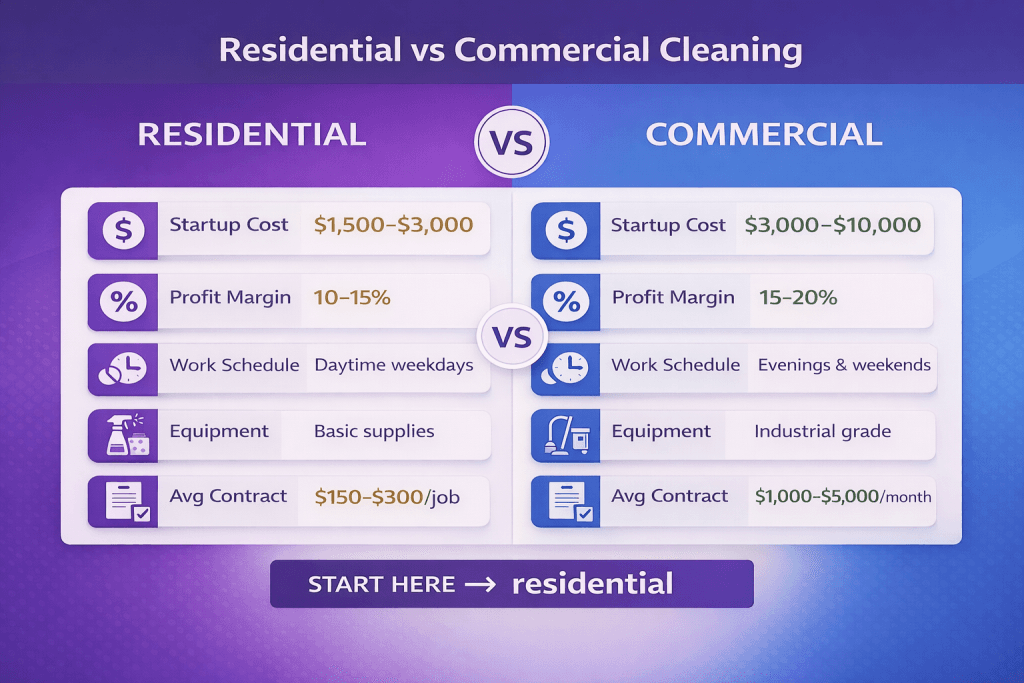
Your business name and legal structure affect everything from taxes to personal liability. Get this right from the beginning.
Choosing a Business Name
Your name should be easy to spell and remember, professional enough for commercial clients, available as a domain name, and not already registered in your state.
Search your state’s Secretary of State website to check availability.
If you’re using a name other than your legal name, you’ll need to file a “Doing Business As” (DBA). Consider trademarking through the U.S. Patent and Trademark Office if you plan to expand beyond your local area.
Business Structure Options
A sole proprietorship is the simplest to set up, with no separation between personal and business assets. You’re personally liable for business debts and lawsuits. Best for testing the waters before committing fully.
A Limited Liability Company (LLC) protects personal assets from business liabilities, offers more credibility with commercial clients, and provides pass-through taxation where profits are taxed on your personal return. Best for most cleaning businesses planning to grow.
A partnership for businesses starts with a co-founder, offering shared control and liability. Requires a clear partnership agreement.
A corporation offers maximum liability protection but has more complex tax requirements. Best for larger operations or franchise plans.
For most new cleaning businesses, an LLC offers the best balance of protection and simplicity. The filing fee typically runs $70-$800, depending on your state.
Operating legally protects both you and your clients. Requirements vary by location, but here’s what most cleaning businesses need.
General Business License
Nearly every city or county requires a general business license to operate legally. Check your local government website; many now offer online applications. Fees typically range from $50 to $150 annually.
Home Occupation Permit
If you’re running your business from home (which most new cleaning businesses do), you may need this additional permit. It confirms your business activities comply with residential zoning.
Sales Tax Permit
Required if you’re selling cleaning products alongside services, or if your state taxes cleaning services. Check with your state’s department of revenue.
Environmental Permits
Only necessary if you’re handling or disposing of hazardous cleaning chemicals. Most standard cleaning operations don’t need these.
For a detailed breakdown of licensing requirements by state, check our complete cleaning business license guide.
Pro tip: Many localities offer a combined registration process where you can register your business name, apply for licenses, and set up tax accounts in one session. Ask your local Small Business Development Center (SBDC) for guidance; their services are free.
Insurance isn’t optional; it’s what separates legitimate businesses from risky ventures. One accident without coverage could bankrupt your business and put your personal assets at risk.
Essential Coverage Types
General Liability Insurance runs $48 per month and covers third-party claims for bodily injury or property damage. If you accidentally break a client’s antique vase or someone trips over your equipment, this protects you.
A Business Owner’s Policy (BOP) bundles general liability with property insurance, often at a lower combined premium. Good option if you have significant equipment to protect.
Workers’ Compensation Insurance is mandatory in most states once you hire employees. Covers medical expenses and lost wages for work-related injuries. Even if you’re solo now, understand these requirements before your first hire.
Bonding isn’t technically insurance, but important for client trust. A surety bond provides clients with financial protection if an employee steals or damages property. Many commercial clients require bonded cleaning services.
Commercial Auto Insurance covers you if you’re using a vehicle for business purposes, since your personal auto policy likely doesn’t cover accidents during work.
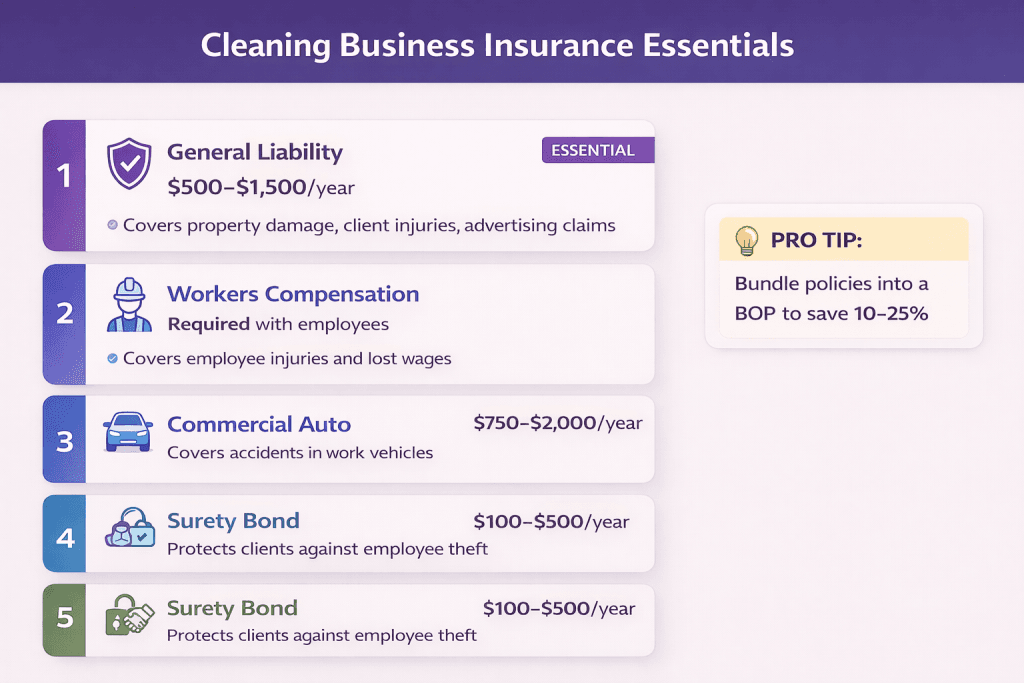
Getting Coverage
Start by getting quotes from multiple insurers who specialize in small service businesses. The Hartford, Next Insurance, and Hiscox all offer cleaning business packages. Expect to pay $1,000-$3,000 annually for comprehensive coverage as a solo operator.
Clean financial records aren’t glamorous, but they’re essential for surviving tax season, understanding profitability, and eventually securing business loans.
Separate Your Finances
Open a dedicated business checking account and credit card. Mixing personal and business finances creates accounting nightmares and can jeopardize your LLC’s liability protection.
Choose Accounting Software
QuickBooks and Xero are industry standards for good reason. They track income and expenses, generate invoices, and simplify tax preparation. Many field service management platforms integrate directly with accounting software to automate the process.
Track Everything
Keep records of income from each job, supply costs and equipment purchases, vehicle mileage, insurance premiums, marketing expenses, and contractor payments.
Consider Professional Help
Even if you handle day-to-day bookkeeping yourself, having an accountant review your setup initially and prepare annual taxes can prevent costly mistakes. Look for someone familiar with service businesses.
Your equipment directly impacts service quality and efficiency. Invest in commercial-grade supplies that last; cheap tools create more problems than they solve.
Essential Supplies for Residential Cleaning
For cleaning solutions, budget $100-$200 for all-purpose cleaner, glass cleaner, bathroom disinfectant, and floor cleaner. Tools like microfiber cloths, scrub brushes, squeegees, and dusters run $75-$150.
Equipment, including a commercial vacuum, mop system, bucket, and spray bottles, costs $300-$600. Safety gear such as rubber gloves, knee pads, and safety glasses adds $50-$100. Transport items like a cleaning caddy and supply organizer run $30-$50.
Equipment Upgrades for Specialized Services
Carpet cleaning requires an extraction machine ranging from $200-$2,000, depending on commercial vs. portable models. Window cleaning needs extension poles, professional squeegees, and a ladder for $150-$400. Pressure washing requires a commercial pressure washer at $300-$3,000.
Eco-Friendly Options
Green cleaning products cost slightly more but attract environmentally conscious clients willing to pay premium rates. Plant-based cleaners, refillable containers, and microfiber systems reduce both environmental impact and long-term supply costs.
Supplier Recommendations
Janitorial supply distributors offer better pricing than retail for wholesale purchases. Stock up on frequently used items through bulk buying to reduce per-unit costs. Look for commercial-grade labels and professional reviews as quality markers.
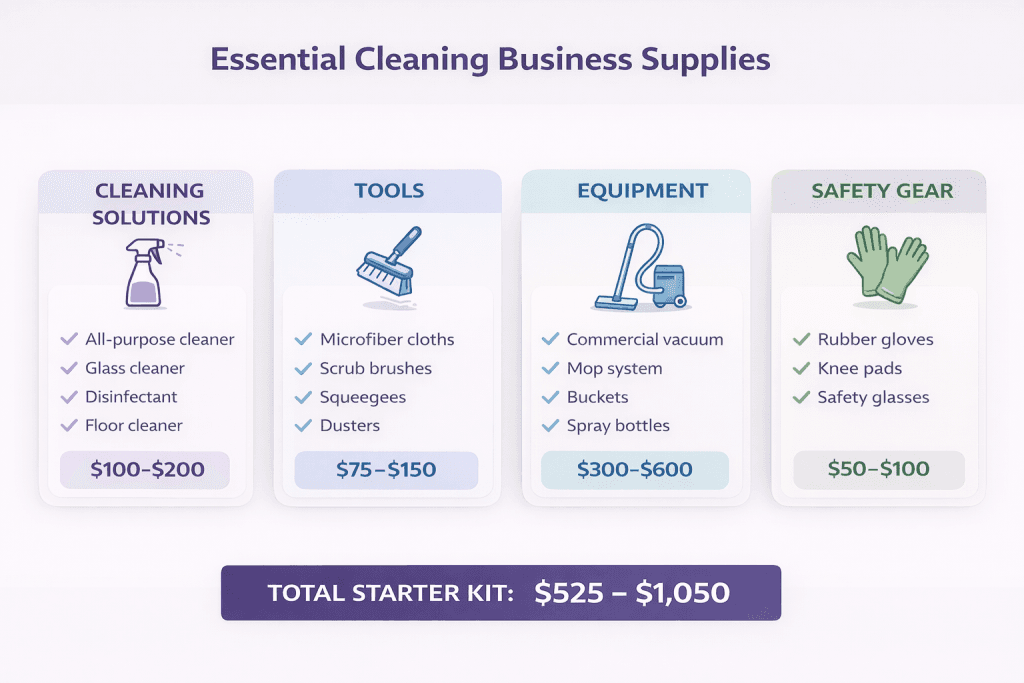
Pricing determines profitability. Too low and you’ll burn out working long hours for minimal profit. Too high and you’ll struggle to win clients. Here’s how to find the sweet spot.
Common Pricing Models
Hourly rates typically range from $25-$50 per hour for residential and $25-$60 per hour for commercial. Best for jobs with unpredictable scope or first-time clients. The downside is that it punishes efficiency; faster cleaners earn less.
Flat rates quote a fixed price for the entire job. Best for standard services, you can accurately estimate. Requires experience in knowing how long jobs actually take.
Per square foot pricing typically ranges from $0.05-$0.20 per square foot, depending on service type. Best for commercial contracts and large spaces. Provides easy scaling for different property sizes.
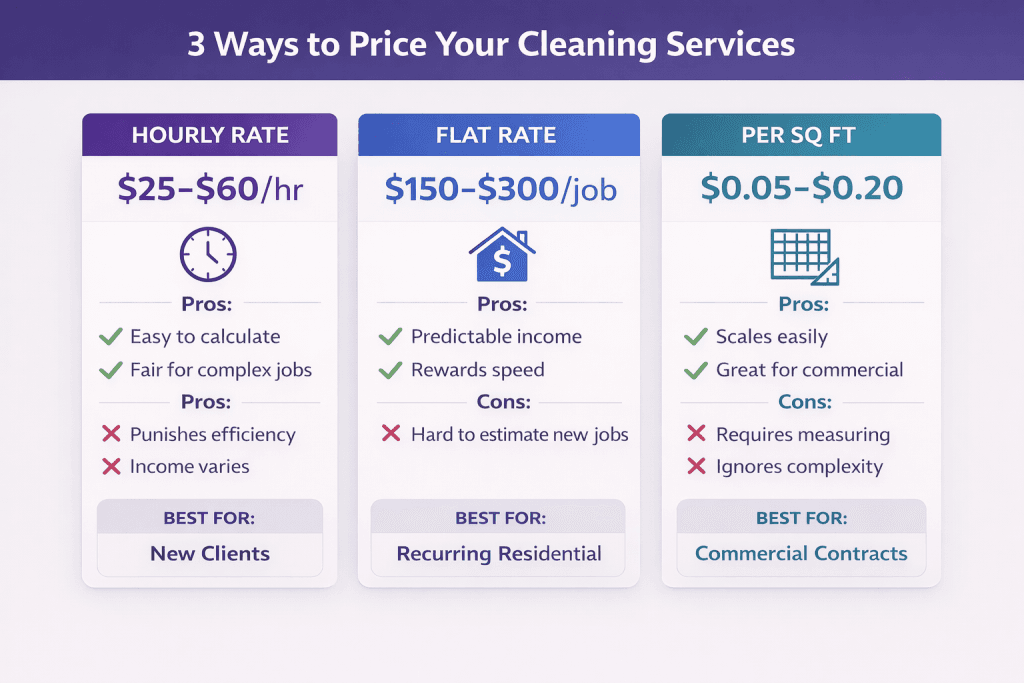
Free Tools to Help You Price: Use our free house cleaning cost calculator to quickly estimate job costs and set profitable rates. Once you’ve quoted a job, create professional documents with our cleaning estimate template and cleaning invoice template.
How to Calculate Your Cleaning Rates?
First, determine your hourly cost, including labor, supplies, equipment wear, insurance, and vehicle costs. Add a profit margin, typically 20-40% above costs. Research competitors to ensure your pricing is competitive for your service level. Factor in travel time between jobs in your calculations.
Sample Calculation
Your target wage might be $20 per hour. Add $3 for supplies and equipment, $2 for insurance and licenses, $4 for vehicle costs, and $2 for overhead like phone and software. That brings your total cost to $31. With a 30% profit margin, adding $9, your minimum hourly rate should be $40.
For a comprehensive pricing breakdown with calculators, check our detailed guide on how to charge for cleaning services.
A great cleaning service means nothing without customers.
Here’s how to build your client base from zero.
Build Your Online Presence
Your website needs a clear description of services offered, service area, and contact information, pricing information (at least ranges), photos of your work (before/after shots work great), and an online booking option, which reduces friction significantly.
Setting up an online booking system allows potential clients to schedule services without phone calls, increasingly expected by younger homeowners.
Want to learn how to do it? Explore how to set up an online booking system.
Your Google Business Profile is free and essential for local search visibility. Collect reviews religiously. Post updates and photos regularly. Respond to all reviews, positive and negative.
For social media, Facebook and Instagram work best for residential cleaning, while LinkedIn works better for commercial cleaning leads. Post transformation photos, cleaning tips, and client testimonials. Don’t overthink it; consistency matters more than perfection.
Generate Your First Clients
Start with your network. Tell everyone you know about your new business. Offer discounted rates to friends and family in exchange for honest reviews. Ask for referrals once you’ve delivered great service.
For local marketing, try door hangers in target neighborhoods, business cards at local businesses like coffee shops, laundromats, and real estate offices, and joining local Facebook groups and Nextdoor, where you help first and promote second. Partner with related businesses like property managers, realtors, and moving companies.
Promotional strategies include a first-time customer discount of 10-15%, a referral bonus program, and package deals for recurring service.
For more detailed client acquisition strategies, see our complete guide on how to get clients for your cleaning business.
The Review Game
Reviews make or break local service businesses. After every job, ask satisfied clients to leave a Google review. Make it easy by sending a direct link via text or email. Respond to every review professionally. Address negative reviews promptly and constructively.
As jobs start coming in, the operational side can quickly become overwhelming. Scheduling conflicts, missed appointments, lost client information, and invoice chaos are common growing pains.
What You’ll Need to Manage
You’ll be juggling client contact information and service history, job scheduling and team assignments, route planning between appointments, estimates, invoices, and payment tracking, supply inventory, and team communication once you hire.
Tools for the Job
Spreadsheets work initially, but they break down fast once you’re handling more than a handful of weekly appointments.
Most successful cleaning businesses eventually adopt cleaning business software that centralizes customer relationship management, job scheduling and dispatching, invoicing and payment processing, route optimization, and reporting and analytics.
The right software pays for itself through reduced administrative time and fewer missed appointments. Look for platforms designed for cleaning and field service businesses rather than generic small business tools.
Check out our comparison of the best cleaning schedule apps to find what fits your needs.
Operational Best Practices
Standardize your process by creating checklists for each service type. Document everything by taking before/after photos for every job. Communicate proactively by confirming appointments and sending arrival updates. Build systems early because what works for 5 clients won’t work for 50.
Here’s a realistic breakdown of startup costs for a solo cleaning business:
Business registration and license run $50-$400. LLC formation costs $50-$500. Insurance for the first year is $500-$2,000. Cleaning equipment and supplies cost $500-$2,500. Marketing and branding run $200-$1,000. Website and domain cost $100-$500. Software subscriptions range from $0-$600. Transportation is $0 if you have an existing vehicle or up to $3,000 for equipment.
Total estimated range: $1,400-$10,500
Most cleaning businesses can launch for under $3,000 if you already have reliable transportation and start with basic residential services. Add specialized equipment for carpet cleaning, pressure washing, or commercial work, and costs climb toward $10,000.
Keeping Costs Down
Start with essential supplies only, expand as revenue grows. Use free marketing channels like Google Business Profile, social media, and referrals. Consider used commercial equipment in good condition. Take advantage of free trials before committing to software subscriptions.
Here’s a quick visual of your launch roadmap, followed by the key tips that’ll set you apart from day one.
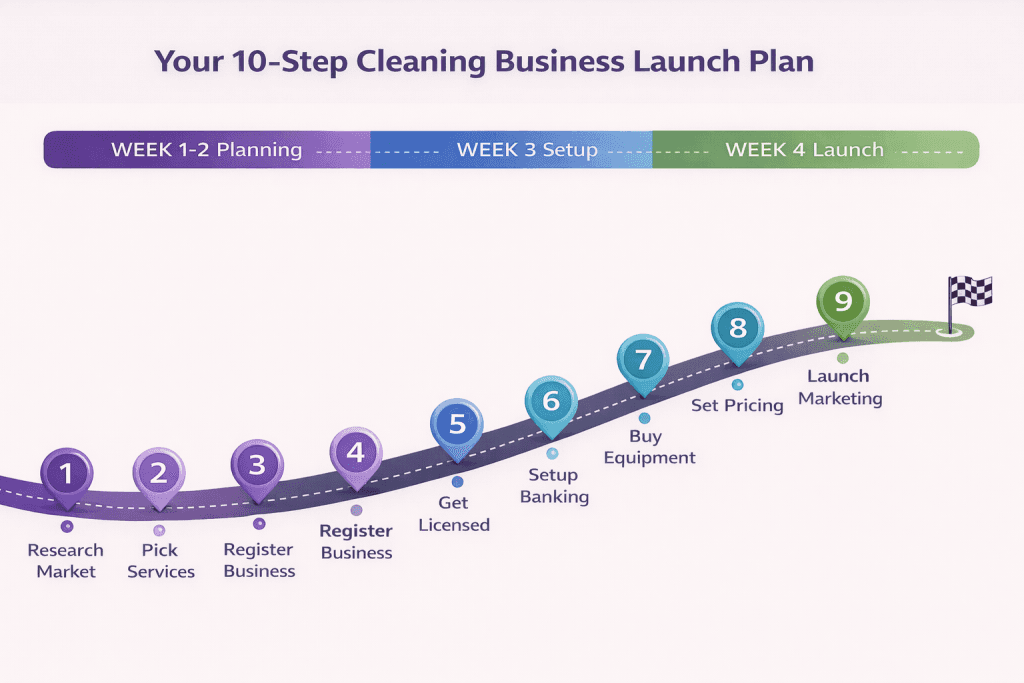
1. Start with One Niche
Don’t try to be everything to everyone. Master residential cleaning before adding commercial. Perfect standard cleaning before offering deep cleans. Focused expertise beats scattered services.
2. Validate Before Investing
Talk to 10 potential customers before buying equipment. Pre-sell a few jobs if possible. Real market feedback beats assumptions.
3. Price for Profit, Not Just Competition
The cheapest cleaner in town often goes out of business first. Price based on your costs and target margin, not just what competitors charge.
4. Build Systems from Day One
Even if you’re solo, document your processes. How do you handle scheduling? What’s your cleaning checklist? How do you follow up on quotes? Systems enable growth.
5. Focus on Retention, Not Just Acquisition
A client who books weekly cleaning is worth 52x more than a one-time job. Prioritize service quality and relationship building over constant new customer hunting.
6. Get Reviews Early and Often
Five reviews in your first month matter more than fifty reviews in year two. Ask every satisfied customer, make it easy, and respond to everything.
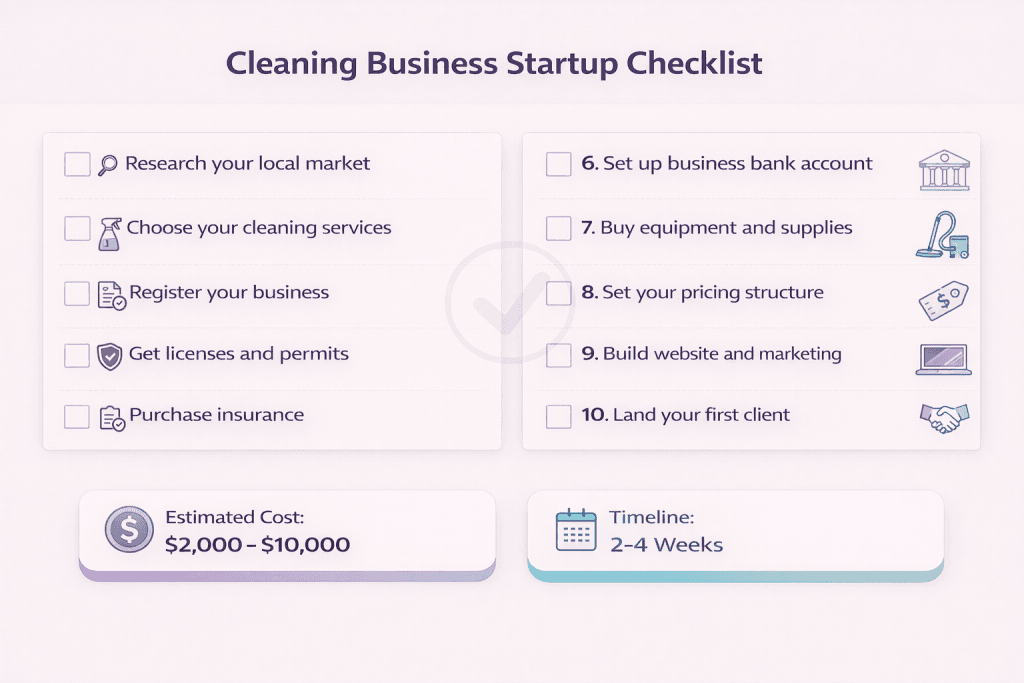
Most cleaning businesses can launch within 2-4 weeks.
Starting a cleaning business is genuinely achievable for anyone willing to put in the work. Low startup costs, consistent demand, and flexible scheduling make it one of the most accessible paths to business ownership.
But “accessible” doesn’t mean “easy.” Success requires treating this like a real business from day one, proper licensing, adequate insurance, professional pricing, and systematic operations. The cleaning businesses that fail usually skip these foundations, not the actual cleaning work.
Follow this guide step by step. Research your market. Handle legal requirements properly. Price for profit. Build your marketing engine. Deliver exceptional service consistently.
The demand is there. The opportunity is real. What you do with it is up to you.
Step 11: Don’t Do It All Manually.
Scheduling, invoicing, client follow-ups, route planning, FieldCamp automates the admin stuff so you can grow past 5 clients without burning out.
Solo operators typically earn $30,000-$60,000 annually working full-time. Cleaning business owners with employees can reach $100,000+ in profit, though this requires significant operational complexity. Your actual earnings depend on pricing, efficiency, client retention, and how many hours you’re willing to work.
No. Most successful cleaning businesses start as solo operations. This keeps overhead low, simplifies operations, and lets you refine your service before adding complexity. Many owners stay solo by choice, while others hire once they have reliable recurring revenue.
Yes, when run properly. Cleaning businesses typically achieve 10-30% profit margins after all expenses. The keys to profitability are pricing adequately (not racing to the bottom), minimizing drive time between jobs, retaining recurring clients, and controlling supply costs.
At a minimum, general liability insurance. As you grow, add workers’ compensation (required with employees), commercial auto insurance, and consider bonding for client trust. Budget $1,000-$3,000 annually for comprehensive coverage.
Focus on what large companies can’t offer: personal relationships, flexibility, attention to detail, and responsive communication. Target underserved niches. Build genuine reviews from satisfied customers. Your size is an advantage for clients who want consistent, personalized service.
Start where you have the most connections and the lowest barriers. Residential cleaning requires less equipment and insurance, making it easier to test the waters. Commercial cleaning offers larger contracts but demands more equipment, higher insurance limits, and often after-hours availability. Many businesses start residential and add commercial over time.